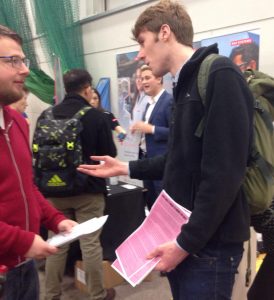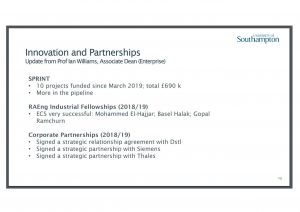
At the SUSU AGM a motion was passed to support The Green New Deal, which is a list of reforms which attempt to make the university more ethical. An element of the Deal which caused particular contention was as follows: “Suspend research collaboration with and fully divest from fossil fuel producing companies. Suspend research collaboration on projects related to armaments“. The issue for many people was that cutting funding for these projects would put jobs at risk and that the military is so ingrained in scientific research that it would prevent research that may not even have military applications. A case for ending projects that only have military applications is a viable moral position to take however.
The way that the results of these projects are utilised enables atrocities to occur. Take BAE Systems, for example, which has close ties to the university and is Britain’s biggest arms company, meaning it plays an integral part in enabling Britain to exercise its military power abroad. Evidence for BAE’s role in continuing the current invasion of Yemen was discussed in a recent Guardian article:
“The Saudi bosses absolutely depend on BAE Systems,” John Deverell, a former MoD mandarin and defence attache to Saudi Arabia and Yemen, told me. “They couldn’t do it without us.”
A BAE employee recently put it more plainly to Channel 4’s Dispatches: “If we weren’t there, in seven to fourteen days there wouldn’t be a jet in the sky.” According to the UN, the blockade around Yemen that is being enforced with ships and planes sold by Western countries is responsible for most of the civilian deaths (which are approximately projected to reach 250,000 by the end of the year, 60% of whom will be children).
A PhD student at Southampton was recently awarded for his BAE funded research which entailed designing components for battle ships that may not unimaginably be sold to the Saudi Navy. Hundreds of Yemeni fishermen have been killed by the naval blockade, including one instance during which 18 of them were captured and then had a rocket fired at their departing vessel. The final report of the multi million pound ‘ORCHID project’ (which was funded in part by BAE and had University of Southampton staff working on it) details how the research could be applied to drone technology. How these projects enable atrocities to occur were shown by French military documents leaked to the press:
The DRM documents detail precisely that Saudi fighter-bomber aircraft are equipped with a technological marvel designed and maintained by French engineers. This is the pod Damoclès, a high performance, long-range targeting pod made by French defence group Thalès, which, fixed to the underside of an aircraft, allows pilots to guide by laser any type of missile onto its target.
A New York Times investigation from last year shows that this precision does not decrease civilian casualties but instead allows them to be more precisely targeted and systematically de-develops the country. The article details how a well that was being drilled was targeted and civilians that were simply trying to survive were killed by ordnance that Southampton University very well could have had a role in making.
The role of these companies is not merely limited to using staff for research projects but they also are given access and influence to the student population as a whole. At a meeting I attended last year for graduate engineers, a BAE official who had negotiated their partnership with Southampton University explained that they were advising the university on what content to teach students in their courses so as they would be more able to serve their ends. The Engineering and Science Careers fair last year had a significant number of weapons companies that were invited to recruit students. I and a few other students also attended to hand out information beside the BAE stall (pictured above). There was no information given about what the effects of their work are. When I asked the Leonardo representative what their thermal imaging cameras were used for, footage of cricket being played was shown as an example. Students on the whole were receptive to what we had to tell them but we were informed by campus security that we were on private property and we were asked to leave. The university is currently funneling students into these jobs without giving them all of the information necessary to inform their decision. My own experience at the careers fair and the vote on the Green New Deal shows that when they are provided with a broader range of information they are against the university following their current policy. In a particular case, a student who was gifted £100’s by BAE for being the ‘most improved student’ took the money to donate it to Campaign Against the Arms Trade and he expressed his disapproval at the company having a role in his degree.
There are far more pressing concerns than making some of the poorest people in the worlds’ lives more miserable, such as climate change. A report by Campaign Against the Arms Trade details how the hundreds of thousands of people in the UK working in the weapons industry could have their expertise utilised to build up the UK’s renewable energy infrastructure. With renewable energy prices decreasing and private companies working on these technologies, it is certainly worth asking whether it would be viable to have Southampton’s staff working more on these problems. Recent trends show that this is not the case however. In a presentation members of the University administration delivered, it was shown that of the three companies that corporate partnerships had been formed with in the past year, two of them are arms companies. This included The Defence Science and Technology Laboratory, which is part of the Ministry of Defense that designs technologies that are used directly in current conflicts.

It does have to be remembered that this is currently taking place within a broader context of the marketisation of higher education and a significant part of the UK’s industry being made up of armaments. When I spoke to somebody on the university’s legal team about requests for information not being responded to they showed me some information about the universities finances and in their words it was not financially viable to end these relationships. Whether this is true or not I do not personally know. There is historical precedent for it being done however. At Harland and Wolff, ship builders went on strike and demanded that they use their skills to develop renewable energy – today they are building off-shore wind turbines. During the height of the anti-war movement in America in the late 1960s, MIT set up a panel of experts which accessed their work for the military and in the end they ended their collaboration with them. Noam Chompsky, who was on the panel, was an anti-war activist but was against these measures being taken. His reasoning was that the research would continue whether it occurred at MIT or elsewhere, and if it was at MIT at least there would be some public oversight. These are fair points and show that this a nuanced issue and that a panel at Southampton would have to assess the viability of ending these relationships and if those working on them could work on other, more ethical, projects.
In discussions that were had within the Green New Deal group a few caveats to the proposal were put forward, such as not cutting funding for projects that are currently underway and allowing these projects to finish so as not to endanger jobs and projects that only have direct military applications. The university’s clear preference for arms companies and the access and influence they have over students would also be ended. If anyone would like to help out with our efforts please feel free to message me and I can add you to our group chat.



